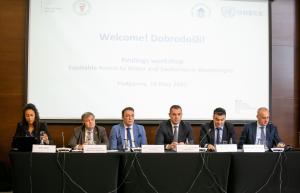
Guaranteeing safe access to drinking water and sanitation remains a challenge in the pan-European region, with 16 million people still lacking access to basic drinking water services and over 29 million people not having access to basic sanitation, including hundreds of thousands who have to practice open defecation. This regional trend is also reflected in Montenegro, a country with stark geographical disparities when it comes to access to water and sanitation.
Under the human rights framework, water and sanitation services must be affordable and ensured to all, including to the most vulnerable communities. To realize the human rights to water and sanitation, targeted measures and actions are required.
Montenegro initiates coordinated process to close equity gaps in access to water and sanitation
To assess the policy landscape on equitable access to water, sanitation and hygiene (WASH) in Montenegro, the country carried out a self-assessment exercise using the Equitable Access Score-card, a tool first developed ten years ago to support countries to assess policies in place to ensure equity in access to water and sanitation, and which has already been applied in 12 countries across the pan-European region.
The project took place under the framework of the Protocol on Water and Health, serviced by UNECE and WHO-Europe, and to which Montenegro is a Party since 2020. Several guidance and tools on how to enhance equitable access to water and sanitation have been developed.
The preliminary findings of the self-assessment were presented and discussed during a national workshop (Podgorica, 16 May 2023), organized by the Institute of Public Health of Montenegro in collaboration with UNECE and support from the Ministry of Health and Prevention of France. The workshop provided an opportunity for government and municipality representatives, water service providers, civil society and other relevant stakeholders to review and analyze the results of the assessment which “will serve to identify the actual situation related to access to water and sanitation across the country and to improve that access in the regions where it is not sufficient at this point," as highlighted by the Minister of Health of Montenegro, H.E. Mr. Dragoslav Šćekić. H.E. Mr. Christian Thimonier, Ambassador of France to Montenegro, also emphasized the importance of prioritizing challenges to address them with concrete measures.
Lack of data remains a challenge in Montenegro and the broader region
Discussions concluded that the lack of data remains a significant challenge reflecting regional trends, which self-assessments carried out in other countries had also revealed. Montenegro’s results also shed light on the fragmentation of institutional responsibilities when managing WASH services, which aggravates coordinated action. The need to define and recognize vulnerable and marginalized communities to better address their needs was also deemed important.
Self-assessment exercise laid the foundation for targeted measures
To address the identified data and policy gaps, Montenegro expressed its willingness to develop an action plan to further enhance equitable access to safe water and sanitation in the country. Based on the workshop's outcomes, the action plan could envisage an in-depth review of the concerned laws and plans to identify possible areas for improvement to further reflect the issue of equitable access to water and sanitation. Dedicated targets on equitable access will also be set as part of the obligations under the Protocol on Water and Health.
The findings revealed and analyzed at the workshop also serve as an excellent opportunity for Montenegro to address the provisions that arise from the recast EU Drinking Water Directive and the upcoming revision of the Urban Wastewater Treatment Directive on equitable access to water and sanitation, which Montenegro, as an EU candidate country, could transpose into its legislation, particularly when it comes to addressing the needs of vulnerable and marginalized communities.

